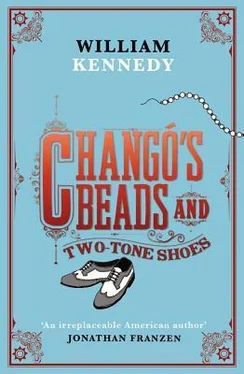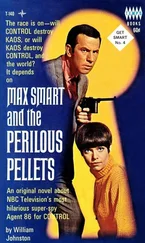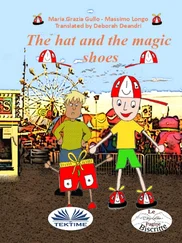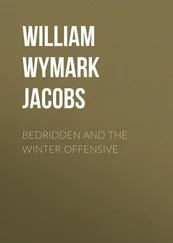Quinn heard a whisper and movement and saw, indistinctly, a man on foot, then, as clouds moved beyond the moon, saw he was brown-skinned, with a straw hat, shirtless, a fragment of tattered linen on his loins. He wore a machete on his side, a cartouche, and a rifle was slung on his back. Quinn spoke the code word mentioned in the letter and then they moved together toward Quinn knew not what — the beginning of something that had taken shape in him long before he ever heard of Céspedes.

Colonel Barreras was telling the news people at La Marea del Portillo about the Batista government’s generosity toward a family of six, and reporters followed him into a rebuilt shack. Quinn walked toward a peasant in tattered clothes who was sitting crosslegged in front of his house, a bohío with thatched roof, earthen floor and two chickens visible inside; and Quinn read in the man’s face something other than gratitude to the army. This house had not been rebuilt. Behind the man sat a near-toothless crone holding a child with what Quinn took to be rickets. The child was drinking water out of a tin can.
“ Hola, amigos, ” Quinn said to the peasant and his woman. “What did the army do for you?” He spoke in Spanish.
“They gave me beans and rice.”
“What work do you do up here?”
“There is no work.”
“How do you earn money?”
“There is no money.”
“How do you live, how do you eat?”
“I eat what grows. I cut cane last year and I drove a cane truck, worked in the coffee harvest last year, but not this year.”
“I have a relative who drives a truck up here,” Quinn said. “Arsenio Zamora. Do you know him?”
The man cocked an eye with surprise in it, but said nothing.
“Arsenio Zamora is my wife’s cousin. Renata Rivero from Holguín. Her brother is Alfie Rivero. Renata has not seen Arsenio in two years. She very much wants to see him. They are cousins.”
“Arsenio Zamora has five thousand cousins.”
“My wife would stand out among ten thousand. She is called Renata. She is beautiful and Arsenio will remember her. He has an eye for women. If anybody sees Arsenio please tell him Renata, the sister of Alfie Rivero, wants to see him.”
“I do not know people who see Arsenio.”
“If you do, tell them Renata married a reporter from the Miami Herald .”
“What is reporter?”
“Newpaper man. A writer. Miami newspaper.”
“Newspaper?”
“Okay, olvídalo . My wife is a cousin of Alfie Rivera. Se llama Renata. Prima de Arsenio. ¿Entiende? ”
“ Prima. She want to see Arsenio?”
“ Exactamente. Renata. Cousin of Arsenio.”
Lieutenant Cordero came over to them and asked the man, “What are you telling him?”
“He’s telling me,” Quinn said, “how he cuts sugar cane and harvests coffee for a living, but he didn’t work this month because the army helped him and gave him free food. Él está muy feliz, very happy, verdad, señor? ”
The man shrugged an ambiguous yes.
“He is very grateful to the army,” Quinn said.
“We’re moving on,” the lieutenant said to Quinn.
Quinn saluted the cross-legged man and went with the lieutenant.

In the forest El Quin and the brown rebel, both on foot, chopped vines and briars with their machetes as they moved, the horse moving with them. They rested in a dry streambed, faces bloody with scratches from trees and thorny overgrowth, and ate berries they had picked. El Quin sipped from his canteen and asked the rebel why he had joined Céspedes as a Mambí warrior. He said if he had not become a warrior he would still be a slave. Whether warrior or slave he would die, but it was better to die as a killer of Spaniards than to let the slave drivers kill you. Quinn wanted to tell the man he had lunch with three slave drivers in a sugar mill at Villa Clara, pretending to seek work as one of them. But then he decided that the warrior might misunderstand his ruse and would only hear this stranger saying he wanted to be a slave driver. He would then swing his machete and slice off Quinn’s head.

Renata heard the drum in a dream, a Santeria drum, and was moved by it. She opened her eyes and the drum was not a dream. She opened the window of her hotel room and as she listened she moved to its beat without willing the movement. It entered her, took charge, and reminded her of her mother dancing at the Biltmore Yacht Club, moving in a way that she herself had never moved, nor wanted to; but the beat was as old as Cuba. She had heard the Santeria drum so often, but this seemed new, and she was dancing. She looked out to find the source of the drum but saw only a few army cars parked on the empty edges of Céspedes Park. Then she saw women in black dresses, dozens of them streaming out of the cathedral in what was clearly a planned demonstration. They immediately raised placards, CESEN LOS ASESINATOS DE NUESTROS HIJOS — MADRES CUBANAS — Stop killing our children — and walked from the cathedral to the park; but a dozen soldiers with rifles blocked their way and more soldiers moved across the park as backup. The women took a new direction and the troops followed them in a moving blockade. A military car stopped on the edge of the park near San Pedro and an army lieutenant colonel stepped out to watch what was unfolding.
Renata was dressed for driving, flared gray skirt, powder blue blouse with buttons. She put on her blond wig and pinned it, pushed into her shoes. She found a black scarf and put it in her skirt pocket. She went down the stairs to the lobby, crossed the park to where the women, three dozen at least, had been halted. She spoke to a heavy woman at mid-throng, but with only partial knowledge of the reason for this protest. She had heard on the radio that two bloodied bodies of young men who had disappeared from their homes or cars in recent nights had been found on the beach horribly abused; but she was not yet aware of the official madness of the past three nights, a terror unleashed against the people of Santiago, none of it reported on the radio.
“Did you lose someone?” she asked the heavy woman.
“The son of my sister.”
“I lost my greatest friend.”
“Here?”
“In Havana.”
“Everybody is losing,” the woman said. “The disease. I am old enough to remember Machado when I lost two uncles, and my mother remembers the war with Spain when the beast Weyler killed whole villages.”
“My father was shot in Machado’s time,” Renata said.
“The soldiers will come after us now,” the woman said. “They will beat and rape us.”
“Do you want to kill them?”
“I don’t kill things,” the woman said. “I would make them disappear back up into the cursed stomachs of their mothers.”
“What are you doing here?”
“The new American ambassador, he is in the Ayuntamiento just there,” and she pointed toward City Hall where three cars and a limousine were parked. The lead women moved down Calle San Pedro but they did not get far. The troops held them back with rifles. “ Libertad, ” one woman yelled and many echoed her.
Renata wondered: Why am I talking with strangers under siege? Is it true I’m in love with death? Diego was in love with death and killed himself out of love. Am I a child of suicide? If I die the revolution loses a soldier. She tied the black scarf around her arm in solidarity with the women. She could still hear the drum but faintly, moving away, and she did not understand its source. But she felt the beat and still felt the impulse not only to dance but to dance well. This was strange and now she had the thought that all this came with Quinn, who is new and rare and a bit mad.
Читать дальше















